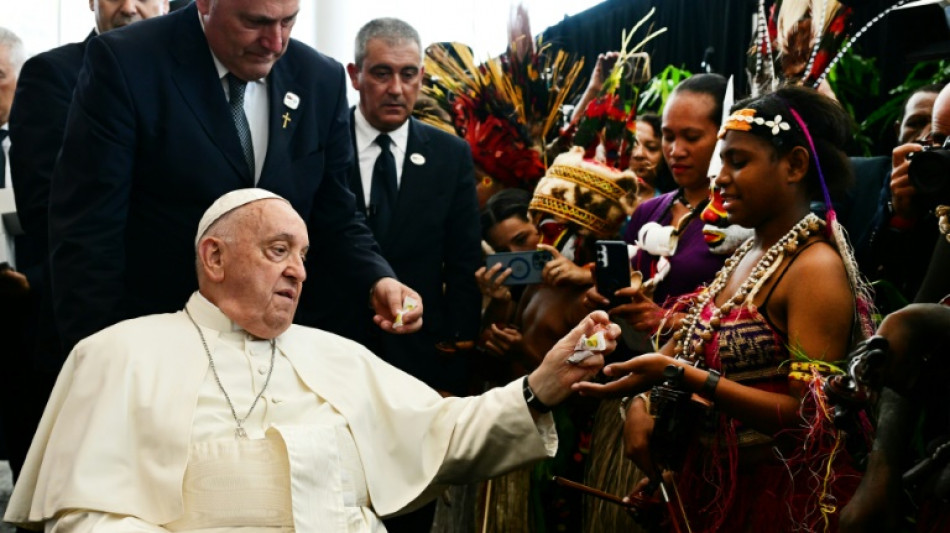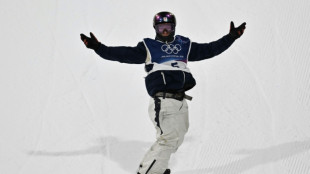
-
 NFL embraces fashion as league seeks new audiences
NFL embraces fashion as league seeks new audiences
-
What's at stake for Indian agriculture in Trump's trade deal?

-
 Real Madrid can wait - Siraj's dream night after late T20 call-up
Real Madrid can wait - Siraj's dream night after late T20 call-up
-
Castle's monster night fuels Spurs, Rockets rally to beat Thunder

-
 Japan votes in snow-hit snap polls as Takaichi eyes strong mandate
Japan votes in snow-hit snap polls as Takaichi eyes strong mandate
-
Pakistan's capital picks concrete over trees, angering residents

-
 Berlin's crumbling 'Russian houses' trapped in bureaucratic limbo
Berlin's crumbling 'Russian houses' trapped in bureaucratic limbo
-
Neglected killer: kala-azar disease surges in Kenya

-
 Super Bowl set for Patriots-Seahawks showdown as politics swirl
Super Bowl set for Patriots-Seahawks showdown as politics swirl
-
Sengun shines as Rockets rally to beat NBA champion Thunder

-
 Matsuyama grabs PGA Phoenix Open lead with Hisatsune one back
Matsuyama grabs PGA Phoenix Open lead with Hisatsune one back
-
Washington Post CEO out after sweeping job cuts

-
 Haiti's transitional council hands power to PM
Haiti's transitional council hands power to PM
-
N. Korea to hold party congress in February, first since 2021

-
 Thailand votes after three leaders in two years
Thailand votes after three leaders in two years
-
Swiss joy as Von Allmen wins first gold of Winter Olympics

-
 George backs England to 'kick on' after Six Nations rout of Wales
George backs England to 'kick on' after Six Nations rout of Wales
-
Malinin upstaged as Japan keep pressure on USA in skating team event

-
 Japan's Kimura soars to Olympic gold in snowboard big air final
Japan's Kimura soars to Olympic gold in snowboard big air final
-
Vail's golden comets Vonn and Shiffrin inspire those who follow

-
 Veteran French politician loses culture post over Epstein links
Veteran French politician loses culture post over Epstein links
-
Japan's Kimura wins Olympic snowboard big air gold

-
 Arteta backs confident Gyokeres to hit 'highest level'
Arteta backs confident Gyokeres to hit 'highest level'
-
Hojlund the hero as Napoli snatch late win at Genoa

-
 England's Arundell 'frustrated' despite hat-trick in Wales romp
England's Arundell 'frustrated' despite hat-trick in Wales romp
-
Lollobrigida skates to first Italian gold of Winter Olympics on her birthday

-
 Arundell hat-trick inspires England thrashing of Wales in Six Nations opener
Arundell hat-trick inspires England thrashing of Wales in Six Nations opener
-
Chile's climate summit chief to lead plastic pollution treaty talks

-
 Rosenior hails 'unstoppable' Palmer after treble tames Wolves
Rosenior hails 'unstoppable' Palmer after treble tames Wolves
-
French ex-minister offers resignation from Paris cultural hub over Epstein links

-
 New NBA dunk contest champ assured and shooting stars return
New NBA dunk contest champ assured and shooting stars return
-
Shiffrin says will use lessons learnt from Beijing flop at 2026 Games

-
 Takaichi tipped for big win as Japan votes
Takaichi tipped for big win as Japan votes
-
Lens return top of Ligue 1 with win over Rennes

-
 Shiffrin learning from Beijing lessons ahead of Milan-Cortina bow
Shiffrin learning from Beijing lessons ahead of Milan-Cortina bow
-
Demonstrators in Berlin call for fall of Iran's Islamic republic

-
 'Free the mountains!": clashes at Milan protest over Winter Olympics
'Free the mountains!": clashes at Milan protest over Winter Olympics
-
Townsend accepts pressure will mount on him after Italy defeat

-
 BMW iX3 new style and design
BMW iX3 new style and design
-
Suryakumar's 84 leads India to opening win over USA in T20 World Cup

-
 Lollobrigida skates to first Italian gold of Milan-Cortina Games
Lollobrigida skates to first Italian gold of Milan-Cortina Games
-
Barca beat Mallorca to extend Liga lead

-
 Gyokeres lifts Arsenal nine clear as Man Utd pile pressure on Frank
Gyokeres lifts Arsenal nine clear as Man Utd pile pressure on Frank
-
Late Guirassy winner for Dortmund trims Bayern's lead atop Bundesliga

-
 'Free the mountains!": protest in Milan over Winter Olympics
'Free the mountains!": protest in Milan over Winter Olympics
-
Gyokeres double helps Arsenal stretch Premier League lead

-
 New Skoda Epiq: modern with range
New Skoda Epiq: modern with range
-
Six Nations misery for Townsend as Italy beat sorry Scotland

-
 Spain, Portugal face fresh storms, torrential rain
Spain, Portugal face fresh storms, torrential rain
-
Opinions of Zuckerberg hang over social media addiction trial jury selection


Visiting Papua New Guinea, pope says natural resources must benefit all
Pope Francis visited Papua New Guinea Saturday, where he called for vast natural resources to benefit the "entire community" -- a politically charged demand in a nation where many believe their riches are being stolen or squandered.
Addressing political and business leaders, the 87-year-old pontiff hailed his hosts as being rich in culture and in natural resources -- a nod to vast reserves of gold, copper, nickel, gas and timber.
But, he suggested, the tens of billions of dollars made from digging, dredging and drilling the earth needed to benefit more than a fraction of the country's 12 million people.
"These goods are destined by God for the entire community," Pope Francis said.
Despite its resource wealth, Papua New Guinea is one of the poorest countries in the Pacific.
Between a quarter and half the population lives in extreme poverty. Scarcely more than 10 percent of homes have electricity.
Even if "outside experts and large international companies must be involved in the harnessing of these resources", they should not be the only ones to benefit, the pope said.
"It is only right that the needs of local people are given due consideration when distributing the proceeds and employing workers, to improve their living conditions," he added.
It is a message likely to resonate with millions of Catholics in Papua New Guinea -- and with millions more in resource-rich regions of Africa, Latin America and elsewhere.
Twenty-two-year-old pilgrim Jonathan Kais, from Manus Island, welcomed the pope's remarks and said he hoped they would spur the government to provide better services.
"The service we receive in our villages by our leaders at the parliament, it's not much (compared to) what they are getting from the resources of the country," he told AFP.
- 'Poverty hardly changed' -
For decades, Papua New Guinea has been dotted with vast American, Australian, Canadian, European and Chinese-run mines.
A $19 billion project led by ExxonMobil has produced tens of millions of tonnes of liquified natural gas since operations began in 2014.
But economists have found little evidence that any of the projects have helped poor Papua New Guineans.
A recent World Bank study showed that between 2009 and 2018, the country's gross domestic product per person grew by more than a third on the back of the resource boom.
"Poverty hardly changed over that time," the report's authors said.
- 'Spiral of violence' -
Pope Francis is on a marathon 12-day visit to the Asia-Pacific, visiting Indonesia, East Timor and Singapore as he promotes interfaith dialogue and embraces regions on the periphery of world affairs.
On Saturday he also made a plea for Papua New Guineans to "stop the spiral" of tribal violence that has killed untold numbers of people and displaced tens of thousands more.
"It is my particular hope that tribal violence will come to an end," he said.
"It causes many victims, prevents people from living in peace and hinders development."
There are few reliable estimates as to how many people have died during decades of tribal unrest between dozens of clans in the country's Highlands.
But UN agencies estimate that about 100,000 people have been displaced by the cycle of retaliatory attacks, which have intensified in recent years.
The murders are often extremely violent, with victims hacked by machetes, burned, mutilated or tortured. Civilians, including pregnant women and children, have been targeted in the past.
An influx of mercenaries and automatic weapons has made clashes much more deadly. Where bows, spears and clubs were once the weapons of choice, now tribesmen have a veritable armoury of SLR, AK-47, and M16 rifles.
Papua New Guinea's stretched government has tried suppression, mediation, gun amnesties and a range of other strategies to control the situation, with little success.
But experts say the violence has little to do with ancient customs, and is more about the modern problems of a surging population, a breakdown in traditional rules of war, joblessness and the rising cost of living.
And there is growing concern that violence is spreading to other parts of the country.
In July, at least 27 people -- among them 11 children -- were massacred in Angoram District, not far from the northern coast.
M.AlAhmad--SF-PST




